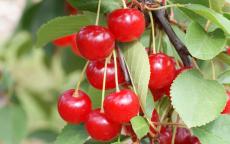- Related cherry trees categories:
- Sweet cherry trees9
Tart cherry trees
Tart cherries, also known as acid or sour cherries, are more acidic than their sweet cherry cousins. This makes them much more useful in the kitchen, where cooking and preserving works on the acid content and develops rich tangy flavors.
Tart cherries usually belong to the species Prunus cerasus, whereas sweet cherries are in the species Prunus avium.
There are essentially two categories of tart cherries. The Morello types, which have dark flesh and dark juice, and a sweet / tart flavor, and the Montmorency types, also known as Amarelles, which have lighter flesh and clearer juice and less sugar. Both types originated from Europe.
The ripening times of tart cherries are generally a bit later than for sweet cherries - an early-season tart cherry will ripen in the middle of the sweet cherry season.
Tart cherries often have good levels of healthy anthocyanins.
Balaton
A late-season tart cherry, great for pies and jams, with a sweet tangy flavor and high sugar content - can also be eaten out of hand.- Picking season: Late
- Self-fertility: Self-fertile
- Fruit color: Red - dark
Danube
An attractive red tart cherry which can also be eaten fresh.- Picking season: Mid
- Self-fertility: Partially self-fertile
- Fruit color: Red
Jubileum®
Jubileum is one of the earliest-ripening tart cherries, and also one of the sweetest.- Picking season: Early
- Self-fertility: Partially self-fertile
- Fruit color: Red
Montmorency
If you want to make a traditional American cherry pie, Montmorency is the variety you need.- Picking season: Late
- Self-fertility: Self-fertile
- Fruit color: Red
Surefire
Surefire is a late-bloom and late-ripening tart cherry.- Picking season: Late
- Self-fertility: Self-fertile
- Fruit color: Red

